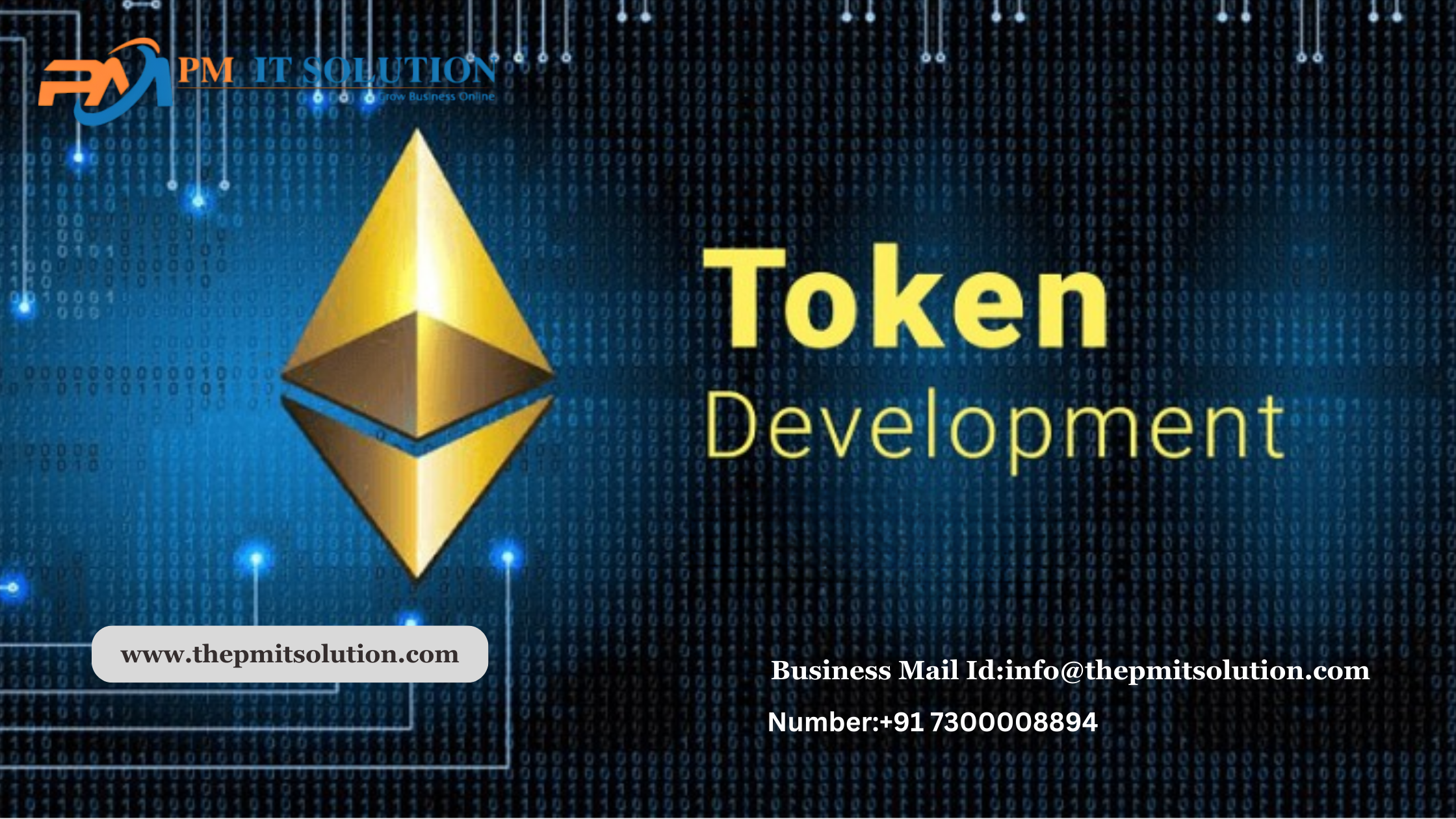Unveiling the Future: Token Development and Cryptocurrency Exchange Development
Introduction
In the fast-evolving landscape of the digital economy, the realms of token development and cryptocurrency exchange development have emerged as pivotal elements driving the decentralized revolution. As blockchain technology continues to redefine traditional financial systems, businesses and individuals are increasingly exploring the potential of creating their own tokens and establishing cryptocurrency exchanges. This comprehensive blog post delves into the intricacies of both token development and cryptocurrency exchange development, shedding light on their significance, processes, challenges, and the profound impact they have on the future of finance.
The Genesis of Token Development
In the era of blockchain, tokens have become the cornerstone of decentralized applications and ecosystems. Token development represents the process of creating digital assets that can serve various functions within a blockchain network. Whether as a means of exchange, utility, or security, tokens unlock new possibilities in the digital economy.
Token creation typically involves defining the purpose of the token, choosing a suitable blockchain platform, and implementing smart contracts. Ethereum, with its robust smart contract capabilities, has been a popular choice for token development. The process requires meticulous attention to details, as the token's design, functionality, and underlying technology will directly impact its adoption and success.
Transitioning from a traditional mindset to a decentralized one involves understanding the potential use cases of tokens. Whether it's creating fungible tokens for currencies, non-fungible tokens for unique assets, or governance tokens for decentralized decision-making, the versatility of token development empowers innovators to reshape industries and redefine economic paradigms.
The Cryptocurrency Exchange Landscape
As tokens gain prominence, the need for platforms facilitating their exchange becomes increasingly evident. Cryptocurrency exchanges act as the bridges connecting token creators and users, providing a marketplace for buying, selling, and trading digital assets. The development of a cryptocurrency exchange involves intricate technicalities and regulatory considerations.
Choosing between centralized and decentralized exchanges is a pivotal decision in the development process. Centralized exchanges, governed by a single authority, often provide a user-friendly experience but may raise concerns about security and control. On the other hand, decentralized exchanges operate on blockchain technology, ensuring enhanced security and reducing the risk of single points of failure.
Security is a paramount concern in cryptocurrency exchange development. Implementing robust encryption, secure key management, and adopting industry best practices are imperative to safeguard users' assets. Regulatory compliance is another crucial aspect, with jurisdictions worldwide working to establish frameworks to govern cryptocurrency exchanges and protect investors.
The Synergy: Token Integration on Cryptocurrency Exchanges
The convergence of token development and cryptocurrency exchange development marks a pivotal moment in the evolution of decentralized finance (DeFi). Integrating newly created tokens onto cryptocurrency exchanges widens their reach and liquidity, unlocking opportunities for both creators and users.
Smart contract standards like ERC-20 and ERC-721 play a pivotal role in facilitating seamless token integration. Cryptocurrency exchanges need to ensure compatibility with these standards to support a diverse range of tokens. Additionally, providing a user-friendly interface for token listing and trading enhances the overall user experience.
Token integration goes beyond technical aspects, encompassing strategic partnerships, marketing efforts, and community engagement. Collaborations between token creators and cryptocurrency exchanges can amplify the visibility and credibility of new tokens, fostering a thriving ecosystem.
Challenges in Token Development
While the potential of token development is vast, it is not without its challenges. Navigating the complex regulatory landscape, ensuring security, and gaining user adoption are hurdles that creators must overcome. Regulatory uncertainty can impede innovation, making it crucial for token developers to stay abreast of legal developments and compliance requirements.
Security vulnerabilities pose a constant threat, with hackers targeting both token creators and their users. Implementing robust security measures, conducting regular audits, and engaging with cybersecurity experts are essential to mitigate risks. Moreover, achieving widespread adoption requires effective marketing and community building, turning token development into a multifaceted endeavor.
Interoperability is another challenge in token development. With multiple blockchain networks and standards, ensuring seamless communication between different tokens and platforms becomes crucial for creating a connected and efficient ecosystem.
Overcoming Challenges in Cryptocurrency Exchange Development
Developing a cryptocurrency exchange is no small feat, and overcoming challenges is essential for ensuring its success and sustainability. Regulatory compliance remains a significant hurdle, with different jurisdictions imposing varying rules on cryptocurrency exchanges. Engaging with legal experts and proactively adapting to evolving regulations is key.
Security is an ongoing concern for cryptocurrency exchanges, given the attractiveness of these platforms as targets for malicious actors. Implementing advanced security measures, conducting regular audits, and establishing partnerships with cybersecurity firms can bolster the resilience of the exchange against potential threats.
Operational scalability is another challenge, especially as cryptocurrency exchanges experience surges in user activity. Designing a robust and scalable infrastructure, leveraging cloud services, and continuously optimizing performance are critical to ensuring a smooth and efficient exchange operation.
The Role of Smart Contracts in Token Development
Smart contracts, self-executing contracts with the terms of the agreement directly written into code, play a pivotal role in token development. They automate processes, eliminate intermediaries, and enhance the efficiency and transparency of transactions. When developing tokens, choosing the right smart contract platform and ensuring secure and audited smart contract code are crucial steps.
The versatility of smart contracts extends beyond simple transactions. They enable the creation of complex decentralized applications (Daps) that can revolutionize industries such as finance, supply chain, and governance. Token developers must carefully consider the capabilities and limitations of smart contracts to unleash their full potential.
Interoperability of smart contracts is a growing focus, aiming to facilitate communication and collaboration between different blockchain networks. Standards like the Ethereum Virtual Machine (EVM) compatibility enable smart contracts to function seamlessly across various platforms, fostering a more connected and interoperable blockchain ecosystem.
Innovations in Cryptocurrency Exchange Development
Cryptocurrency exchange development is not stagnant; it continually evolves to meet the demands of the market and technological advancements. Innovations such as decentralized exchanges (DEXs), automated market makers (AMMs), and non-custodial trading platforms have gained prominence.
Decentralized exchanges operate without a central authority, providing users with more control over their funds and reducing the risk of hacking. Automated market makers use algorithms to facilitate trading without the need for traditional order books, creating a more dynamic and efficient trading experience. Non-custodial exchanges allow users to retain control of their private keys, enhancing security and privacy.
Integration of advanced trading features, such as margin trading, futures contracts, and decentralized finance (DeFi) protocols, continues to redefine the landscape of cryptocurrency exchanges. These innovations not only cater to experienced traders but also democratize access to sophisticated financial instruments for a broader audience.
The Importance of Token omics in Token Development
Token omics, the economic model governing the distribution and behavior of tokens within a blockchain ecosystem, is a critical aspect of token development. Careful consideration of token omics can influence the success and sustainability of a project. Factors such as token supply, distribution mechanisms, and utility within the ecosystem must align with the project's goals and user incentives.
Balancing scarcity and utility is a delicate task in token omics. A limited token supply can create scarcity and potentially drive up demand, but excessive scarcity may hinder the practical use of the token within the ecosystem. Defining clear use cases and incentives for holding and using the token contributes to a healthy and vibrant token economy.
Token omics also extends to governance mechanisms, allowing token holders to participate in decision-making processes. Implementing transparent and fair governance structures enhances community engagement and decentralization, contributing to the long-term success of the project.
User Experience: A Decisive Factor in Cryptocurrency Exchange Development
In the competitive landscape of cryptocurrency exchanges, user experience is a decisive factor in attracting and retaining users. A seamless and intuitive interface, fast and reliable order execution, and responsive customer support contribute to a positive user experience.
Ensuring the security of user funds is paramount. Implementing two-factor authentication (2FA), cold storage for funds, and regularly auditing security protocols inspire trust among users. Transparent communication about security measures and incident response plans further enhances user confidence.
Innovative features such as a user-friendly mobile app, social trading capabilities, and educational resources can set an exchange apart from its competitors. User experience design should prioritize accessibility and inclusivity, making the platform welcoming to both experienced traders and newcomers to the cryptocurrency space.
Token Development and Environmental Concerns
As the world grapples with environmental challenges, the environmental impact of blockchain and token development has come under scrutiny. The energy consumption of certain blockchain networks, particularly those using proof-of-work consensus mechanisms, has raised concerns about sustainability.
Token developers are increasingly exploring eco-friendly alternatives, such as proof-of-stake (Pos) or delegated proof-of-stake (Dipos) consensus mechanisms. These alternatives require significantly less energy, addressing the environmental concerns associated with traditional proof-of-work networks.
Incorporating environmental considerations into token development aligns with the growing trend of sustainable and responsible business practices. It also reflects a commitment to minimizing the carbon footprint of blockchain technology while fostering innovation and decentralization.
Regulatory Landscape for Token Development and Cryptocurrency Exchanges
The regulatory landscape for token development and cryptocurrency exchanges is continually evolving, with governments and regulatory bodies around the world working to establish frameworks that balance innovation with investor protection. The legal status of tokens varies across jurisdictions, ranging from securities to utility tokens.
Token developers must navigate this complex regulatory terrain, seeking legal counsel to ensure compliance with relevant laws and regulations. Understanding the classification of tokens and their implications is crucial for avoiding legal pitfalls and building a sustainable project.
Cryptocurrency exchanges face similar challenges, with regulatory requirements differing significantly from one jurisdiction to another. Obtaining licenses, conducting KYC (Know Your Customer) and AML (Anti-Money Laundering) checks, and adhering to reporting requirements are essential steps for ensuring regulatory compliance and maintaining the trust of users.
Future Trends and the Convergence of Token Development and Cryptocurrency Exchanges
Looking ahead, the future of token development and cryptocurrency exchanges holds exciting possibilities. The integration of artificial intelligence (AI) and machine learning (ML) into token development can enhance security measures, automate processes, and provide valuable insights into user behaviour.
Interoperability between different blockchain networks is expected to play a pivotal role, fostering collaboration and creating a more connected decentralized ecosystem. Cross-chain solutions and the development of blockchain agnostic platforms will enable seamless token transfers and transactions across diverse blockchain networks.
As the industry matures, token developers and cryptocurrency exchanges will likely see increased collaboration with traditional financial institutions. The convergence of traditional finance and decentralized finance (DeFi) can bridge the gap between the two worlds, offering users a broader range of financial services.
Conclusion: Shaping the Future of Finance through Innovation
In the dynamic landscape of digital finance, the symbiotic relationship between token development and cryptocurrency exchange development is reshaping the way we perceive and interact with value. The journey from conceptualizing tokens to trading them on sophisticated exchanges marks a profound shift towards a decentralized and inclusive financial future.
Despite the challenges, the potential for innovation and positive disruption in the realms of token development and cryptocurrency exchanges is vast. By embracing technological advancements, adhering to regulatory compliance, and prioritizing user experience, businesses and individuals can contribute to the ongoing transformation of the financial landscape. As we navigate this exciting journey, the collaborative efforts of token developers, cryptocurrency exchanges, and the broader community will undoubtedly shape the future of finance for generations to come.
BusinessMore posts from PM IT Solution
View posts
Unleashing the Future: Token Development Company and Cryptocurrency Exchange Development
PM IT Solution · · · Introduction · In the dynamic realm of blockchain technology, the evolution of cryptocurrencies has opened up new frontiers. Two pivotal components driving this revolution are Token Development Company and Cryptocurrency Exchanges. This blog post delves into the intricate ...

Mastering Both Sides of the Coin: Satta Matka and Ludo Game App Development Company for Indian Audiences
PM IT Solution · Introduction · In the world of gaming, two popular choices that have captured the attention of Indian audiences are Satta Matka and Ludo. Both games have their roots in traditional Indian culture and have made a seamless transition to the digital realm. If you're looking to tap i ...

Unveiling the Mastery Behind Casino and Rummy Game Development Company
PM IT Solution · Introduction · Casino and rummy are two of the most popular and exciting forms of gambling and entertainment worldwide. Millions of people enjoy playing these games online or offline for fun or money. casino game development company and rummy games offer thrilling and skillful ga ...
Articles from PM IT Solution
View blog
Have you dreamed of building your online casino or satta matka game but need help figuring out where ...

Introduction: · In the ever-evolving landscape of online gaming, poker continues to reign supreme, a ...

Introduction - The Convergence of Innovation · In the ever-evolving digital landscape, two pillars s ...
You may be interested in these jobs
-
Sr. Area Manager
5 days ago
GoKhana Pune, IndiaAbout GoKhana - ToBox Ventures Pvt Ltd: · GoKhana is a full-stack B2B technology company that manages end-to-end food programs for corporates and enables the Next-Gen Digitized Cafeteria. Bringing together an imaginative blend of technology, logistics and food service management, ...
-
Furniture Quality Control
35 minutes ago
Essvee Consultant new delhi, IndiaJOB DESCRIPTION: · Quality Control (QC) in Furniture · Location: New Delhi · Industry Type: Furniture / Interior / Manufacturing Industry · Experience: Min 5yrs · Salary: 30K to 50K · Must have Knowledge in making furniture, Modular furniture · Developing and implemen ...
-
Software Developer
38 minutes ago
RiskInsight Consulting Pvt Ltd chennai, IndiaRequirements · 4 years of hands-on experience in PL/SQL development, with proficiency in Oracle database technologies. · Strong SQL programming skills, including query optimization, indexing, and performance tuning. · Experience with database design, data modeling, and normal ...
You have no groups that fit your search



Comments